The Voters’ Agenda
The public appears ready to extend the congressional debate concerning the regulation of health maintenance organizations (HMOs) to the presidential campaign. When asked to name the one issue they most want to hear the presidential candidates discuss, nearly one-in-five people mention issues related to health care. An additional 14% cite Social Security; one-in-ten name Medicare.
 Americans’ interest in Social Security and Medicare is new to their 2000 campaign agenda. One-in-five now mention an interest in hearing presidential candidates speak about one of these entitlement programs, which were absent in earlier years. Also new to the campaign agenda is gun control, now listed by 7% of the public but previously unnamed.
Americans’ interest in Social Security and Medicare is new to their 2000 campaign agenda. One-in-five now mention an interest in hearing presidential candidates speak about one of these entitlement programs, which were absent in earlier years. Also new to the campaign agenda is gun control, now listed by 7% of the public but previously unnamed.
Gone from the public’s top-of-the-mind concerns are the economy and welfare reform. Only 4% of the public wants to hear candidates talk about the economy, down from 13% who said so in 1996 and 43% who named economic issues in 1991.
Similarly, only 2% of the public now says they are interested in hearing candidates speak about welfare reform, a drop from 12% who said so in 1996. Americans are also less interested in hearing candidates talk about cutting taxes than they were three years ago. Just 9% name taxes as an issue they’d like to hear about, compared to 16% who said so in 1996.
Priorities
Although violent crime is at its lowest point since 1973 and fewer than one-in-ten Americans mention it as an issue candidates should discuss, 76% of the public still considers reducing crime to be a top national priority, when asked to rate a list of issues. Improving education and shoring up Medicare and Social Security are close behind, with almost equal numbers placing these issues at the top of their list of national priorities.(1)
 Smaller but still substantial majorities of Americans place top priority on other issues ranging from social justice to taxes. Roughly six-in-ten say that dealing with the problems of the poor and addressing the concerns of families with children should be top priorities. The same number place protecting the environment, regulating health maintenance organizations, and reducing middle class taxes at the top of the national agenda.
Smaller but still substantial majorities of Americans place top priority on other issues ranging from social justice to taxes. Roughly six-in-ten say that dealing with the problems of the poor and addressing the concerns of families with children should be top priorities. The same number place protecting the environment, regulating health maintenance organizations, and reducing middle class taxes at the top of the national agenda.
Many of the issues emphasized by various elected officials draw only tepid endorsements from the public. Just over a quarter (28%) say that reforming campaign finance laws should be a top priority; support for emphasizing cuts in the capital gains tax is similarly anemic. Limiting access to abortions is a top priority for 26% of Americans, and providing access to the Internet is such for only 11%.
Women place a higher priority on most issues than do men. The greatest difference is on gun control: 62% of women think that this should be a top priority, compared to 39% of men.
Fewer young Americans give top priority to bolstering the Social Security system than do older people. Just over half (55%) of those 18-29 say it should be a top priority, compared to 71% of 30-49 year-olds and 85% of those over age 50. Conversely, overwhelming numbers (85%) of young adults cite education as a top national priority, a rating that falls off among older Americans.
While solid majorities of Democrats, Republicans and Independents agree about how much emphasis to place on reducing crime, this consensus breaks down across other issues. For example, Republicans place a somewhat lower priority on dealing with the problems of the poor and needy, regulating HMOs, strengthening gun control laws, and working to reduce racial tensions than do Democrats. Democrats place a lower priority on dealing with moral breakdown and cutting the capital gains tax.
Current Washington Issues
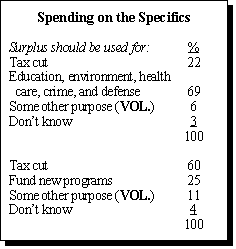 Americans continue to prefer spending on specific programs rather than tax cuts when asked what to do with the federal budget surplus. After reserving two-thirds of the surplus for Social Security, 69% of the public wants the remainder spent on specific programs: “education, the environment, health care, crime-fighting and military defense.”
Americans continue to prefer spending on specific programs rather than tax cuts when asked what to do with the federal budget surplus. After reserving two-thirds of the surplus for Social Security, 69% of the public wants the remainder spent on specific programs: “education, the environment, health care, crime-fighting and military defense.”
The rhetoric of this debate, however, matters. Strong support for spending the surplus disappears when the alternative is “new federal programs.” The two-thirds who back spending on education, the environment, health care, crime-fighting and military defense drops to a meager 25% for new programs. Instead, support for a tax cut soars to 60%.
A mere 51% majority of those following the news of Clinton’s Medicare plan favor it; the remainder divide evenly between opposition and no opinion. Democrats support Clinton’s proposal 63%-to-16%, while Republicans divide 38%-to-34% on the issue. Support for changing Medicare is lower among senior citizens than among those under the age of 65 (43% vs. 54%, respectively).
Backing for the specific components of Clinton’s plan varies from a high of 82% for spending part of the budget surplus to make Medicare financially secure to a low of 42% f
or a cost-of-living increase in the deductible seniors pay.
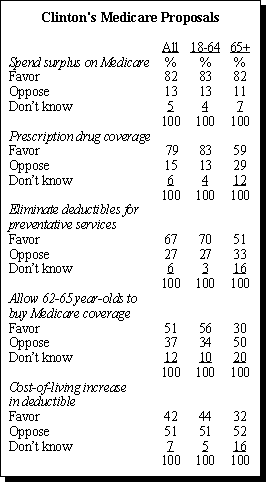 In general, senior citizens are more reluctant to favor changes to Medicare. For instance, while 59% of those over age 65 support providing low-cost prescription drug coverage to Medicare recipients, 83% of those younger endorse the idea.
In general, senior citizens are more reluctant to favor changes to Medicare. For instance, while 59% of those over age 65 support providing low-cost prescription drug coverage to Medicare recipients, 83% of those younger endorse the idea.
Two-thirds of the public supports eliminating the co-payments and deductibles that Medicare recipients pay for preventative services. Just half (51%) of the public backs the proposal to allow those ages 62 to 65 to purchase Medicare coverage. On this, support is again weakest among those age 65 and older (30% support the expansion, compared to 56% of those younger).
Americans of all ages are divided on whether or not to increase the deductible Medicare recipients pay: 42% favor it; 51% oppose this proposal.
A 54%-37% majority of Americans continue to say that the laws should be changed to allow patients to sue their insurance companies when medical treatment is denied or delayed. This opinion changed little over the past year.
Support for the right to sue is particularly strong among those who have followed reports about the American Medical Association’s decision to unionize doctors (63%) as well as among Democrats (59%). Support is weaker among Republicans (47%), people living in rural areas (45%) and the less affluent (44%).
Term Limit Reversal and Guns Matter
Two issues stand out as potentially powerful themes in the upcoming elections: gun control and term limits. Two-thirds of voters say incumbents who voted for gun control should be re-elected. A strong 57% majority says that representatives who did not keep their term-limit pledges should go. And just seven months after the House of Representatives impeached President Clinton, the historic vote appears unlikely to have much bearing on the campaign.
Gun control is the most explosive issue tested in this survey. Among registered voters, 69% say that members who have voted for gun control should be re-elected. This attitude runs especially strong among women: 77%.
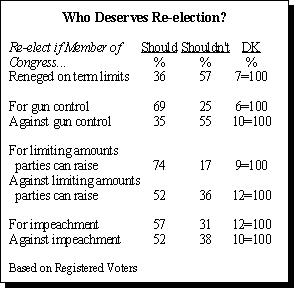 Term limits also generate strong feelings among most voters, with the notable exception of those under age 30. A 57% majority of registered voters say that a member of Congress who has pledged to serve three terms and then decides to run for a fourth term should not be re-elected. Just 48% of young voters agree. While men feel more strongly than women that members of Congress should keep their promise, there is little difference among Democrats, Republicans and Independents.
Term limits also generate strong feelings among most voters, with the notable exception of those under age 30. A 57% majority of registered voters say that a member of Congress who has pledged to serve three terms and then decides to run for a fourth term should not be re-elected. Just 48% of young voters agree. While men feel more strongly than women that members of Congress should keep their promise, there is little difference among Democrats, Republicans and Independents.
Incumbents who support limiting “soft” money in campaigns may get a boost from such a stance, but the issue won’t hurt those who vote against it. If a member votes to limit the amount of money political parties can raise and spend, 74% of voters say the politician should be re-elected. But, when asked about a member who votes against such a measure, 52% said he or she should be re-elected anyway.
Impeachment Anger Softens
Majorities favor the re-election of members who voted both for and against impeachment. Support for those who voted for impeachment is slightly stronger, with 57% of voters saying these representatives should be re-elected; 52% say the same of members who voted against impeachment.
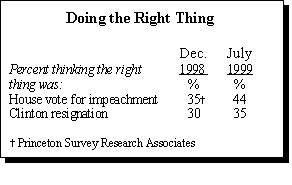 There are other indications in the survey that criticism of Congress for impeaching Clinton may be softening. A greater number now thinks that the House did the right thing in impeaching him than supported the decision in December (44% vs. 35%). Moreover, a slightly larger number believes that Clinton should have resigned than did so just after the impeachment vote (35% vs. 30%).
There are other indications in the survey that criticism of Congress for impeaching Clinton may be softening. A greater number now thinks that the House did the right thing in impeaching him than supported the decision in December (44% vs. 35%). Moreover, a slightly larger number believes that Clinton should have resigned than did so just after the impeachment vote (35% vs. 30%).
Overall, two-thirds of voters want their representative re-elected. But when asked about re-electing most members of Congress, 47% say they should not be sent back to Washington; one-in-four say they should.
Job approval of the Republican leaders in Congress remains low at 36%, and disapproval stands at 45%. While these numbers are basically unchanged over several months, disapproval is particularly strong among older Americans. About half of those over age 50 disapprove of the GOP congressional leaders, compared to slightly more than one-third of those under age 30.
Presidential Politics
A significant number of Americans (46%) know that at this point in the cycle, the 2000 presidential candidates have raised more money than previous contenders. Nearly one-in-three (29%) can name George W. Bush as the candidate with the biggest war chest.
Bush campaign’s fund raising success itself, however, is not likely to be helpful with voters. Two-thirds (65%) of them say that a candidate’s ability to raise money is not a good measure of his or her ability to get things done. This opinion is particularly strong among Independents (72%) and those who know of Bush’s large coffers (75%).
Only 14% of the public is able to name a presidential candidate who has been trying to reform the way election campaigns are financed: 3% specifically name John McCain (for whom campaign finance reform is a principal theme); the same number mention Gore; 2% cite Bush.
Among the GOP candidates, George W. Bush continues to be the heavy favorite in the primaries: 60% of registered Republicans say he is their first choice for the nomination, roughly the same as in December 1998. A distant second, Elizabeth Dole garners just 13% of the Republican primary vote. Fewer than one-in-ten registered Republicans support any one of the other GOP hopefuls.
 Similarly, little has changed in the race between Al Gore and former New Jersey Senator Bill Bradley for the Democratic nod. Support for the candidates among Democratic voters continues to run better than two-to-one in Gore’s favor — 65% say they would like to see Gore as their nominee for president, compared with 29% who prefer Bradley.
Similarly, little has changed in the race between Al Gore and former New Jersey Senator Bill Bradley for the Democratic nod. Support for the candidates among Democratic voters continues to run better than two-to-one in Gore’s favor — 65% say they would like to see Gore as their nominee for president, compared with 29% who prefer Bradley.
Gore leads Bradley in nearly every demographic group, and he does particularly well among African Americans and the less affluent. Bradley’s strongest support among Democrats comes from those who disapprove of Clinton and those who think he should have resigned.
Looking ahead to the general election, Bush performs strongly against both Democratic contenders. Bush continues to lead Gore 53% to 42% in a hypothetical match-up, little changed from his 54%-to-41% advantage in March. Bush bests Bradley by an even wider 57%-to-36% margin.
Bush-Gore Race Okay
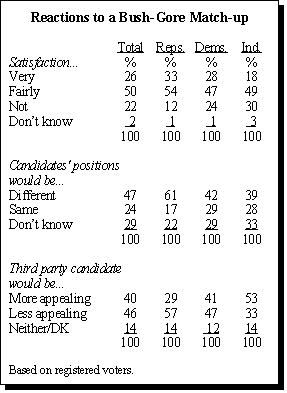 In general, Americans are satisfied with the current field of presidential contenders. A 53% majority of voters say they are satisfied with the candidates. Contentment is higher among Republicans, 70% of whom say they are satisfied with the likely candidates. Only 45% of Democrats and 47% of Independents share this opinion.
In general, Americans are satisfied with the current field of presidential contenders. A 53% majority of voters say they are satisfied with the candidates. Contentment is higher among Republicans, 70% of whom say they are satisfied with the likely candidates. Only 45% of Democrats and 47% of Independents share this opinion.
The prospect of a Bush-Gore contest appeals to voters — 76% say they would be satisfied with this match-up. A 46% plurality says this match-up would make them less interested in a third party candidate, although 40% say that a presidential contest between Bush and Gore would make them more interested in a third party candidate.
There is little indication, however, that more conservative members of the GOP might defect if faced with a Bush nomination. Fully 87% of Republicans say they would be satisfied with a contest between Bush and Gore. Among Republicans, exceptions are hard to find. Only 16% of white evangelicals and 28% of Republicans supporting Quayle, Bauer or Buchanan say they would not be satisfied with the selection of candidates in a Bush-Gore contest. By contrast, 47% of Democrats who prefer Bradley over Gore express dissatisfaction with a Bush-Gore match-up, and 54% say it would make them more interested in a third party candidate.
 Moreover, there is relatively little support for any of the third party candidates tested. Neither Jesse Ventura nor Reform Party candidate Ross Perot — both of whom have high name recognition — generate much support among the electorate. Only 13% of those who have heard of Ventura say there is a good chance they would vote for him, and only 11% of those who know Perot would vote for him. Former Connecticut Governor Weicker fares even worse. Fewer than one-in-four registered voters say they have heard of Weicker, of whom only 5% say there is a good chance they would vote for him.
Moreover, there is relatively little support for any of the third party candidates tested. Neither Jesse Ventura nor Reform Party candidate Ross Perot — both of whom have high name recognition — generate much support among the electorate. Only 13% of those who have heard of Ventura say there is a good chance they would vote for him, and only 11% of those who know Perot would vote for him. Former Connecticut Governor Weicker fares even worse. Fewer than one-in-four registered voters say they have heard of Weicker, of whom only 5% say there is a good chance they would vote for him.
Kosovo Top News Story
The situation in Kosovo kept the attention of the public in the aftermath of the air strikes on Yugoslavia. On the domestic front, President Clinton’s proposals to change Medicare garnered modest interest, and slightly more people followed stories about the presidential campaign and Hillary Clinton than did a month ago. Regardless, large numbers complained that the media was giving too much coverage to the first lady’s bid for a Senate seat from New York.
Nearly one-third (32%) are paying very close attention to Kosovo this month, unchanged since May, and 19% are keeping a very close eye on the changes the president is proposing for Medicare. Furthermore, interest in both the presidential campaign and in Hillary Clinton’s Senate bid is increasing somewhat: 21% are paying very close attention to Mrs. Clinton’s possible run and 15% are giving that much attention to the 2000 presidential contest.
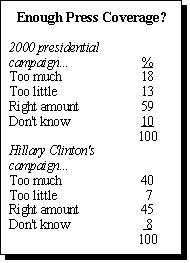 While most Americans are paying some attention to these news reports, 40% nonetheless say the media is paying too much attention to Hillary Clinton; 45% say the amount of coverage has been about right. Older men are most likely to consider the coverage too heavy. Coverage of the presidential campaign, however, is considered about right by almost six-in-ten Americans.
While most Americans are paying some attention to these news reports, 40% nonetheless say the media is paying too much attention to Hillary Clinton; 45% say the amount of coverage has been about right. Older men are most likely to consider the coverage too heavy. Coverage of the presidential campaign, however, is considered about right by almost six-in-ten Americans.
Women’s World Cup soccer was followed very closely by 18% of Americans, the same share that closely tracked the Mark McGwire/Sammy Sosa home run race last summer and similar to the 1998 NCAA basketball tournament which registered 20%. The soccer tournament garnered more attention than either news about the large budget surplus (13%) or the decision by the American Medical Association to unionize physicians (9%).
More E-mail
Use of e-mail grew significantly over the past seven months, with the number of users sending or receiving e-mail everyday up 13 percentage points this year to 46%. The number of people going online for news, however, remains virtually unchanged, with 21% saying they get news online everyday, compared to 25% who said so in December.
 Communicating online poses a familiar problem: junk mail. More than one-third (36%) of those who use e-mail report receiving a lot of unwanted messages, a majority of which are sales solicitations (72%). Junk e-mail, however, is a frustration for just 15% who say the extra messages make it difficult to get to the mail they want to read.
Communicating online poses a familiar problem: junk mail. More than one-third (36%) of those who use e-mail report receiving a lot of unwanted messages, a majority of which are sales solicitations (72%). Junk e-mail, however, is a frustration for just 15% who say the extra messages make it difficult to get to the mail they want to read.
Despite the influx of junk e-mail, many users rely on the Internet as an important medium for communication. A solid majority (58%) of users say they turn to e-mail for important messages; 41% use it only for routine messages. Fully 67% of Internet users who have been online for at least two years use e-mail for important messages.
Nearly half of all e-mail users (43%) say that communicating online has improved their relationships with family and friends. Only 1% say e-mail has worsened their relationships while 56% say their personal relationships have been unaffected.
1. The question about issues in the 2000 presidential campaign asks people to say in their own words what they are interested in hearing about. The national priorities questions asks individuals to respond to a list of issues. The open-ended question captures the most salient issue, while the priority rating taps into broader concerns that may not be at the top of an individual’s mind.


